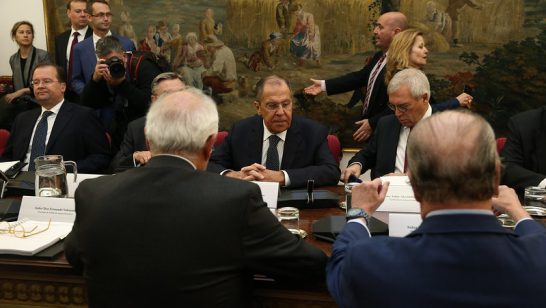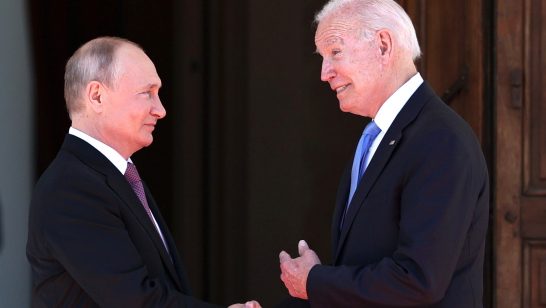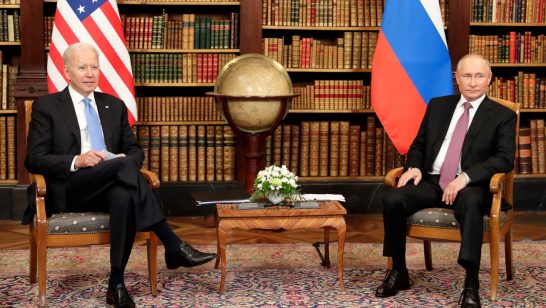
In June, Joe Biden and Vladimir Putin met in a magnificent library in Vienna. It was the first meeting between Biden, new to his office, and Putin, who has known and dealt with every US president since Bill Clinton. Among those watching international diplomacy, some pooh-poohed the meeting, while others criticised Biden for meeting with a man so openly hostile to the West. But the meeting was not just a good idea; it was absolutely crucial. Without a working relationship between their leaders, countries face accidental and exceptionally dangerous mishaps.
“I know we make foreign policy out to be this great, great skill, that somehow is sort of like a secret code,” Biden said after his meeting with Putin on 16 June this year. “All foreign policy is a logical extension of personal relationships. It’s the way human nature functions.” On that basis, he judged the meeting to have been a success: “The bottom line is, I told President Putin that we need to have some basic rules of the road that we can all abide by.” Putin made much the same point: “He’s a balanced and professional man, and it’s clear that he’s very experienced. It seems to me that we did speak the same language.” Biden, in particular, struck a very different tone from his previous comments about Putin, which included calling the Russian president a killer.
Biden and Putin’s summit was more than a getting-to-know-you meeting. The two leaders had an extensive list of thorny issues to discuss, ranging from nuclear arms control to the fate of Alexey Navalny. On the arms control front, the leaders agreed to resume the dialogue between the two countries. Leaders not agreeing to anything more substantive than further talks may seem like a meagre result of a much-anticipated summit. Then again, it’s progress from the highly unpredictable relationship between the countries under the Trump administration.
The most important outcome of the summit is a less technical one – indeed, it’s an entirely psychological one: rapport between the two leaders. Elisabeth Braw
But the most important outcome of the summit is a less technical one – indeed, it’s an entirely psychological one: rapport between the two leaders. As Biden wisely noted, “all foreign policy is an extension of personal relationships”. Consider the course of World War II, when Charles de Gaulle constantly rubbed FDR and Winston Churchill the wrong way. In the early 1960s, with Cold War tensions escalating, Washington and Moscow decided to install a “red telephone”, a hotline between the two leaders to be used in case of extreme emergency. The hostility between the countries remained; indeed, they were still set up for a major war against each other, but even under such conditions they could agree that the two leaders should have an exclusive hotline.
Helmut Schmidt, Germany’s chancellor from 1974 to 1982 and one of the wisest statesmen in modern history, strongly advocated nuclear deterrence of the Warsaw Pact. His passionate support of the stationing of US nuclear weapons on West German soil and earned him enormous consternation and indeed mass protests at home. But Schmidt was also an ardent proponent of dialogue; indeed, as chancellor he supported the construction of a gas pipeline from the Soviet Union to West Germany.
Favouring dialogue doesn’t always need to include business deals, but Schmidt ably demonstrated that it’s possible to pursue two tracks at the same time. (Indeed, he was a strong advocate of NATO’s double-track strategy.) Today, it should be possible – indeed, it is crucial – to maintain a dialogue with Putin while at the same time opposing the annexation of Crimea, the treatment of Navalny, the novichok attack in Salisbury and much else. Dialogue is crucial not for its own sake but because it establishes a human rapport that can help prevent dangerous escalation.
Remember 26 September 1983? On that day, Soviet early-warning systems showed an incoming US nuclear attack. The duty officer, Stanislav Petrov, should immediately have sent the alert up the command chain, prompting a Soviet counterstrike. But Petrov had a “funny feeling in his gut”, as he explained many years later, and concluded that something was wrong. He didn’t report the incoming attack – and indeed, the alarm turned out to be the product of a malfunctioning Soviet computer. Petrov, of course, had never met an American, let alone a US nuclear decisionmaker. But the world constantly faces new situations where one side has to interpret the other side’s intentions.
Without dialogue and some modicum of personal interaction between the respective leaders, such analysis of the other side is impossible. That’s why Biden and Putin were right to meet, regardless of whether the Western public rates Putin or not. Indeed, it’s in the interest of both America and its allies that the two leaders keep meeting. They need to turn their arms control dialogue into a new nuclear treaty. They need to find a way to cooperate on the thorny issue of Afghanistan. And so on. And they need to get so familiar with each other – no, not friendly, just familiar – that they won’t hesitate to pick up that red phone (which, in fact, isn’t red) in a crisis. As the famous slogan of the British supermarket chain Tesco puts it: “every little helps.”
The opinions articulated above represent the views of the author(s) and do not necessarily reflect the position of the European Leadership Network or any of its members. The ELN’s aim is to encourage debates that will help develop Europe’s capacity to address the pressing foreign, defence, and security policy challenges of our time.
Image: President Biden met President Putin for a bilateral meeting in Geneva, Wikimedia Commons.



